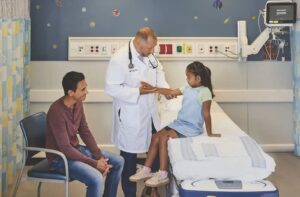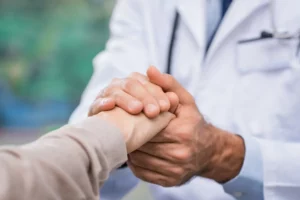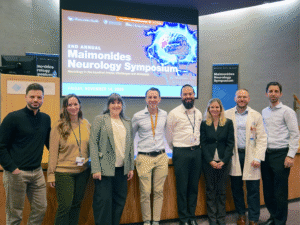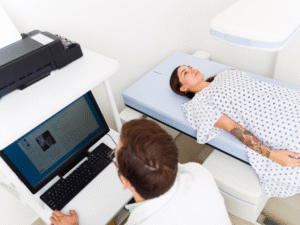Summary
With cancer, time is of the essence. Dr. Kevin Becker discusses the benefits of Rapid Assessment Service, a Maimonides program service that fast tracks cancer patients from diagnosis into treatment.
Listen on Spotify Listen on Apple Podcasts Listen on Google Podcasts
Transcript
Caitlin Whyte: The cancer center offers a rapid assessment service to patients with a suspected cancer diagnosis, allowing them to quickly receive consultation and testing. So here to tell us more about this resource is Dr. Kevin Becker, the division chief of hematology and medical oncology.
This is my med talk. I’m your host, Caitlin white, Dr. Becker, please start out by giving us a brief overview of what cancer rapid assessment service is.
Dr. Kevin Becker: So the rapid assessment service is our program to help patients who have cancer again or other imaging that’s suggests they might have a cancer diagnosis, help them to get the pathologic diagnosis.
So to know if indeed it is cancer, and if so, what type of cancer it is since that’s really our first step in devising, a treatment plan for someone with a new cancer diagnosis. It was really born out of an experience I had with one of my patients about a year before we put this together, I had a, a 40 year old man that’s came to see me for a diagnosis of lung cancer.
But when I heard more about his experience before he got to see me, I really recognized how our system was broken and that we needed to do better. So he had gone to the emergency room, I think. Two or three times before he made it in to see me as a lung cancer specialist and each time he was discharged from the emergency room with instructions to see someone to do testing, to try to make that cancer diagnosis based on the.
Cat scan that they had done in the emergency room and the problems he ran into, where one time he was told to, to follow up with an oncologist, but he couldn’t get an oncology appointment until he had a pathologic diagnosis. A second time, he went to the emergency room with worsening symptoms. He was told to see a pulmonologist, but the first pulmonologist he was scheduled with didn’t take his insurance.
And then the next one that did take his insurance, couldn’t see him for several weeks. So. It wasn’t until he came back to the emergency room a third time now, so sick that he actually had to be admitted in required oxygen, that he got that biopsy, that he needed to make the cancer diagnosis and to get him to a cancer specialist.
So what we recognize is that you need to have someone who’s really expert in what happens in those initial steps. After someone has a, uh, an abnormal cat scan or other imaging. What the right procedure is to, to make a diagnosis and who the rights specialist is to do that procedure, as well as knowing the system to try to get them in as soon as possible.
Caitlin Whyte: So what exactly happens, you know, once I put this into motion, I’m suspected to have this. Possible cancer diagnosis. What happens next in the process?
Dr. Kevin Becker: Yeah. So with one telephone number, either you as a patient or a doctor who has a patient with this abnormal cat scan, uh, can call and get an appointment to see one of our.
Clinicians in the rapid assessment service, we ensure that those appointments are very quick. So we hold ourselves to a standard of within two business days, we try to get people in even faster that whenever possible. So sometimes we’ll even see patients on the day that they call, but at the latest. Two business days from when they call they’ll come in here to the cancer center, they’ll see one of our physicians or nurse practitioners in the program who will find out a little bit more about their medical history, review their scans and set them up to see the right specialist.
If it’s indicated. To, to have a biopsy to diagnose that suspected cancer. The clinicians on our program have a list of all the specialists within my monities who do these diagnostic procedures. And who’ve also committed to getting patients in as soon as possible to make a diagnosis. So usually the, the clinicians in our program get to work even the first time that that call comes in, even before the patient’s coming in.
They’re looking at the scans. They’re trying to decide who the right specialist is. And. Setting up that appointment. So that there’s really minimal delay in between these appointments. Once the procedure is done, they work with our pathology department to get the results back as soon as possible. And they’re also so always working behind the scenes to, to line up the first appointment with the cancer specialist who is going to be able to talk to a patient more about any additional testing that needs to be done or, or make that initial treatment plan.
Some good things about it. We’ve really been successful at getting people in within the first two days of their call. We’re also seeing that most people from the time they called to when they get their procedure done, the most common time in between those is about five days. So it’s a really, I think, much faster than would happen outside of this program.
Caitlin Whyte: Now, why is this urgency getting people in and just a few days so important to cancer care?
Dr. Kevin Becker: Yeah, it’s a good question. So I think of it in two different ways. Guys. One is that I know, uh, from experience in working with patients experience with family members, to that those initial days after someone’s told you a cat scan shows what might be cancer, that’s really the most worrisome.
The scariest time. People are really filled with questions, uncertainty, anxiety, and fear. And the faster that you can get information, the better you can confront that fear and that uncertainty. So we’re really doing it in large part because we know how difficult that time is. I know that feeling that you’re connected with people who are expert in how to deal with this situation and that there.
Helping you through the process as quickly as possible is really reassuring to patients. And the other thing is that we know that’s the sooner you get a diagnosis and the sooner you start treatment, the better the outcomes are. We know that early diagnosis improves outcomes. We know that people that are having symptoms from cancer, that’s the sooner that you can start treatment, the sooner you can make those symptoms better.
So there’s really a lot of good reasons to try to help people through this process as soon as possible. So
Caitlin Whyte: are there virtual options for this rapid care? Especially in this COVID time.
Dr. Kevin Becker: Yeah, that that became really important. Uh, especially in the spring and summer, when, when people were afraid to come in for care, we got lots of questions about, you know, I, I have this possible cancer diagnosis or I have these symptoms that need evaluation, but, but I’m afraid to leave the house.
I think the virtual option is great for people who are concerned about seeking care, but, but have a problem that needed to be addressed. Often, what we can accomplish there is you get getting contact with a clinician who can triage your symptoms. Let, let you know if, if that is something that’s important to be worried about, can take a look at the scans and, and decide how best to deal with this.
A lot of times we can, some things like a biopsy need to be done in person, but deciding if a biopsy needs to be done that. Can often be done virtually. We can also try to cut down on the number of visits needed by coordinating virtually. So that’s sometimes if you need a couple of different tests done that we can try to coordinate those all to be done on the same day, if possible, just to really maximize people’s experience and, and maximize their safety.
Great,
Caitlin Whyte: Dr. Becker, is there anything else you’d like to add? So people know more about rapid assessment
Dr. Kevin Becker: service. The other thing that I think we accomplished with this is that we can really save people from needing to stay in the hospital for some diagnoses. So in the past, before we had this program, it was not uncommon that sometimes a patient would go to the emergency room for some symptoms or even their doctor would send them to the emergency room because they had a cat scan that looked like cancer.
And those patients would get admitted to the hospital and sometimes stay in the hospital for days or even a week or more to get. The testing done to make that diagnosis, we’re able to get that diagnosis done on an outpatient basis often faster than if the patient was in the hospital. And I think most people prefer to be at home than, than in a hospital, even under normal circumstances, let alone during a pandemic.
So that’s another thing that I think we’ve been able to achieve with this, that, that really benefits our patients. Well, Dr.
Caitlin Whyte: Becker, thank you so much for telling us about this critical service. To learn more, please visit us at dot org. This has been my Mo med talk. I’m your host, Caitlin white stay. Well .







